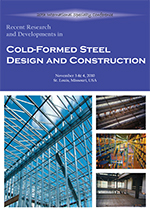Session Dates
03 Nov 2010
Abstract
Shear properties of cold-formed thin-walled steel composite walls are af- fected by many factors, including the section of light-gauge studs, the space of self-drilling screws, the panel on both sides of wall, the distribution of hold down device, etc, which makes it is difficult to estimate the shear strength. In this paper, twelve Q345 light-gauge composite wall specimens with a dimension of 2400mm wide and 3000mm high were designed for shear capacity test. Two kinds of panel combination in the specimens were considered, one is gypsum board on one side and OSB board on another side, the other is gypsum board on one side and corrugated steel sheet on another side. In order to understand the effect of opening holes in the wall on the shear behavior, three kinds of opening patterns, i.e., window open- ings of 600X1200 mm and 1200X1200 mm, and door openings of 1200 X2100 mm were simulated in the tests. It was shown that, the main failure modes of the test specimens were local fragmentation of gypsum boards, shear buckling of corrugated steel sheets, and yielding of end stud near the bottom. Based on the test data, lateral stiffness, shear strength, displacement ductility and energy dissipation coefficient of the composite walls under dif- ferent loading conditions were studied. Finally, based on domestic and for- eign research achievements, analysis method of shear strength of the light- gauge composite walls considering opening under monotonic and cyclic loading was investigated, and design methods for horizontal shear resistance and aseismic design were proposed.
Department(s)
Civil, Architectural and Environmental Engineering
Research Center/Lab(s)
Wei-Wen Yu Center for Cold-Formed Steel Structures
Meeting Name
20th International Specialty Conference on Cold-Formed Steel Structures
Publisher
Missouri University of Science and Technology
Document Version
Final Version
Rights
© 2010 Missouri University of Science and Technology, All rights reserved.
Document Type
Article - Conference proceedings
File Type
text
Language
English
Recommended Citation
Li, Yuangqi; Liu, Fei; Shen, Zuyan; and Yao, Xingyou, "Shear Behaviors of Light-gauge Composite Walls under Monotonic and Cyclic Loading" (2010). CCFSS Proceedings of International Specialty Conference on Cold-Formed Steel Structures (1971 - 2018). 4.
https://scholarsmine.mst.edu/isccss/20iccfss/20iccfss-session9/4
Shear Behaviors of Light-gauge Composite Walls under Monotonic and Cyclic Loading
Shear properties of cold-formed thin-walled steel composite walls are af- fected by many factors, including the section of light-gauge studs, the space of self-drilling screws, the panel on both sides of wall, the distribution of hold down device, etc, which makes it is difficult to estimate the shear strength. In this paper, twelve Q345 light-gauge composite wall specimens with a dimension of 2400mm wide and 3000mm high were designed for shear capacity test. Two kinds of panel combination in the specimens were considered, one is gypsum board on one side and OSB board on another side, the other is gypsum board on one side and corrugated steel sheet on another side. In order to understand the effect of opening holes in the wall on the shear behavior, three kinds of opening patterns, i.e., window open- ings of 600X1200 mm and 1200X1200 mm, and door openings of 1200 X2100 mm were simulated in the tests. It was shown that, the main failure modes of the test specimens were local fragmentation of gypsum boards, shear buckling of corrugated steel sheets, and yielding of end stud near the bottom. Based on the test data, lateral stiffness, shear strength, displacement ductility and energy dissipation coefficient of the composite walls under dif- ferent loading conditions were studied. Finally, based on domestic and for- eign research achievements, analysis method of shear strength of the light- gauge composite walls considering opening under monotonic and cyclic loading was investigated, and design methods for horizontal shear resistance and aseismic design were proposed.



